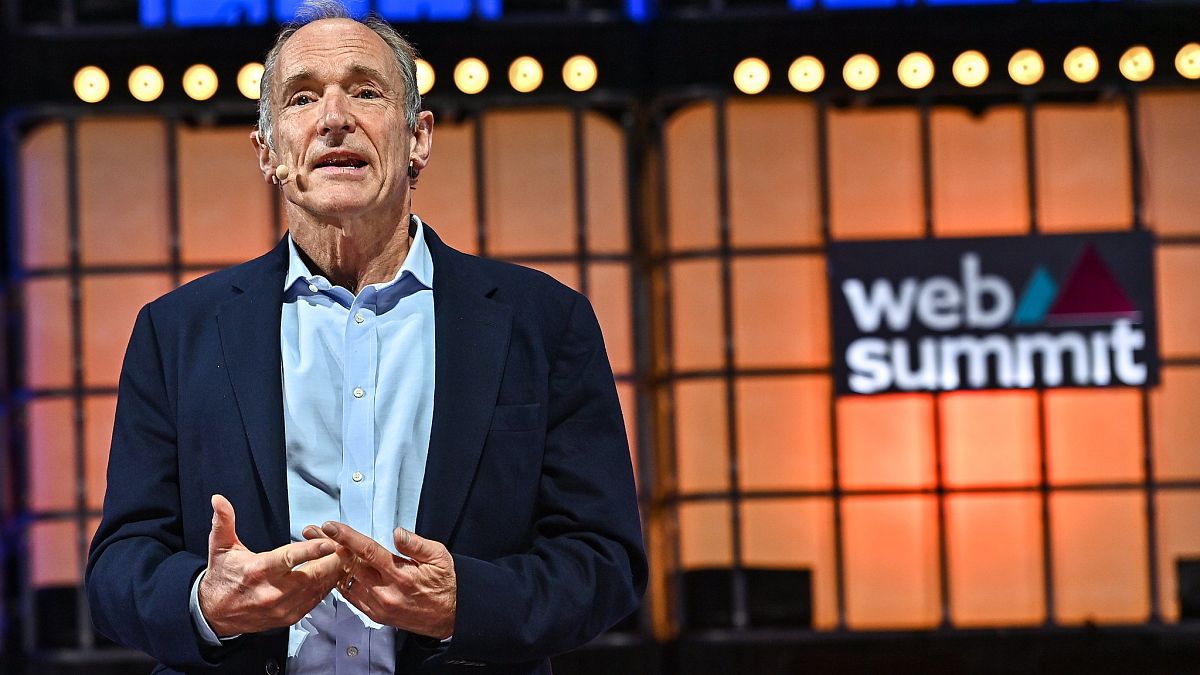World Wide Web inventor Sir Tim Berners-Lee’s hopes for 2025

Sir Tim Berners-Lee told Euronews Next he does not make tech predictions but spoke of his hopes for the web in 2025.
The inventor of the World Wide Web is optimistic that 2025 will be the year of digital human rights but said that there could be a possible backlash against “polarising social media”.
Sir Tim Berners-Lee said he hoped that next year there’s “a wave of standardisation… and data rights, human rights, and digital sovereignty”.
“I feel that we’ll see a sort of wave, some would call it backlash, maybe backlash against the polarising social media,” he added.
Speaking to Euronews Next in November at the Web Summit technology event in Lisbon, Berners-Lee blamed the toxic content produced and shared on social media on algorithms. While developers could easily fix this, he said, the social media platforms do not want to.
“Should you blame the person who wrote [the message]? Well, maybe, but they’re actually a small part of the ecosystem,” he said.
“Maybe you should blame the fact that the algorithm showed that tweet to 2 million people. So the reason why you saw it isn’t that the world is toxic, it’s because that will get you to click, that will get you to raise your eyebrows”.
The World Wide Web (WWW) is in its 35th year after Berners-Lee wrote a proposal to develop a distributed single information system to meet the demand for automated information-sharing between scientists in universities and institutes around the world.
‘Eroding the web’s values’
In an online letter this year, he said the WWW was created to be “a tool to empower humanity,” but that in the past decade “instead of embodying these values, the web has instead played a part in eroding them”.
“The consequences are increasingly far-reaching. From the centralisation of platforms to the AI revolution, the web serves as the foundational layer of our online ecosystem – an ecosystem that is now reshaping the geopolitical landscape, driving economic shifts, and influencing the lives of people around the world,” he added in the statement.
Despite his concerns about the web, he said that he hoped that there would be a “new wave of people realising that there are developers out there,” who can do a lot of “amazing things,” such as with artificial intelligence (AI) or with user data, which can be used for good.
“Every system, every person, every patient ought to have that power and I think that realisation is happening,” he said.
“I think the tech people are building the tech for [digital sovereignty],” he added.
Berners-Lee is the mastermind behind a project called Solid, which gives a person the ability to log into something with their own personal ID via a “Pod,” where you can store your private data and access it very easily.
In simpler terms, it can be thought of as your key or a digital ID that is kept secure.
This, he argues, would prevent bots and false accounts on social media.
But Berners-Lee said it was not just developers who could make a difference in the digital world, but also people in policy and others who “stand up for the rights of digital citizens and the sovereignty of human beings”.
“I think that it’s going to be exciting,” he added.
World News || Latest News || U.S. News
Source link



